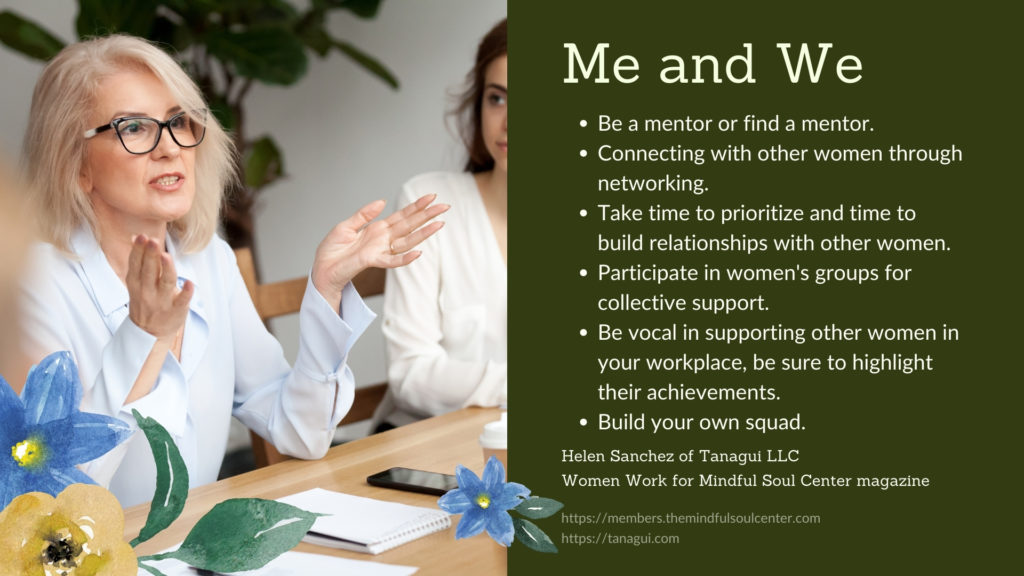Can women acheive equal pay and equality in work? How can women help each other towards these ends? Helen Sanchez in her article gives women actionable steps to take in her series Women Work – from competition to cooperation we uplift each other.
Me or We? Women at work
We have all made professional decisions based on “what is best for me.” I myself have often advised people that at the end of the day, do what is best for you because chances are no one else will.
But as professional women who strive for equality, do we have more impact if we do what is best for the “we,” not necessarily just the “me?” Or are they the same? When you receive an offer for that position you wanted for less money than you expected or less money than it is worth, what if you say –
No, thank you, but I would love the job for what it is worth.
You can then negotiate a fair salary for the position. Not only do you benefit yourself, but these actions benefit all women. Every time a woman pushes through a roadblock, it helps the collective ‘we’ of women.
The Western State-of-Mind
In Western culture, the concept of individualism dominates our thinking. The idea of collectivism is not broadly embraced. Personal achievements and successes are valued. But individual decisions can be based on consideration of what will benefit all women. A 2010 article in Behavior and Brain Sciences referenced a study showing that the pursuit of individual success can manifest in overconfidence. The study showed that 94% of American professors claimed they were “better than average.” This tendency for self-inflation did not show up in other cultures. Self-promotion is a result of our tendency to lean toward individual achievements and successes. Ultimately, considering the impact of our decisions in favor of the collective will benefit all of us.
So, how does this impact our ability to move toward equality for all women? Individualism allows for more significant personal progress, but collectivism can help the female segment of society grow and strengthen in its quest for equality. Suppose we can merge these two so that our results combine doing what is best for us individually and doing what is best for women collectively. In that case, we create the most significant benefit.
As I stated earlier, it is always essential that we make decisions with our own best interest in mind. However, as women who are still struggling to reach equality, we should also consider the impact of our decisions on the greater good of our community. When we fight for equal pay, flexible hours, promotion opportunities, or membership in the “boys club,” we are helping all women to struggle a bit less in the future.
Can the ME and WE work together?
The Me and We already work together. We all know that women have more success, more advancement opportunities, and more choices professionally when they have a mentor or a strong networking initiative. Women helping women get further ahead professionally, whether as a mentor in a one-on-one relationship or as part of a robust professional network. These relationships, this collective support, have helped many women on their career journey. Shelley Zalis reminds us in an article in Forbes that –
“A woman alone has power; collectively we have impact.”
So, when we think about collective support, we need to realize that it is the simple act of women supporting women. Women, of course, face so many hurdles in their quest for advancement, including unconscious bias. Through support, women become a collective and by working together they can benefit individually from the insight that is shared with them through their mentor or network. These are win-win scenarios.
Steps to Keep The WE in ME
- Being a mentor to other women is an important role that women should be actively seeking. Mentors can be critical in supporting other women and enabling them to progress in their careers which ultimately benefits women collectively.
- Connecting to other women through networking offers an advantage, both for women involved in the relationship and for all parties who can benefit.
- Building relationships with women should be prioritized and scheduled on your calendar.
- Researching and participating in women’s groups will help with all aspects of collective support.
- Be vocal in supporting other women in your workplace, be sure to highlight their achievements.
- Build your own squad.
All of these steps not only help women to advance individually but, also help us to work toward the collective effort of equality for all women.
The quick list – what you can do –


